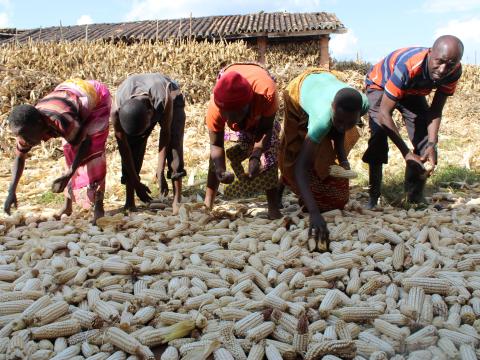Increasing food production through farmer led approach

Once in Kigamba commune of Cankuzo province during the rainy season, it's easy to see small-scale farmers busy in their fields. Tilling the fields is their main way to be able to put food on the table for their families, send their children to school, pay medical bills, etc.
Apart from the small-scale farmers you encounter, Kigamba also has lead farmers who have proved successful a lead farmer World Vision’s approach.
When you meet Pontien, a trained lead farmer, his testimony leaves you with an understanding on how the approach can change the rural life of local farmers.
According to Furashiha Nzisabira, a Resilience and Livelihood specialist at World Vision Burundi, the lead farmer approach serves as an entry point for World Vision to support small scale farmers that in turn pass on the technologies to their peers. The lead farmer train other local farmers on production techniques turning portions of their farms into demonstration sites where they try out new varieties and provide training and expertise to the other farmers.
In Burundi, agricultural activities are practiced by approximately 90% of Burundians and in rural areas small scale farmers make use of unimproved practices and are confronted to lack of improved inputs to end up with poor harvests.
To come up with solutions to such a situation, World Vision embarked on empowering small-scale farmers so that they apply improved techniques and inputs to increase harvests.
In 2023, through its integrated food and nutrition projects, World Vision Burundi was able to reach 293,413 small-scale farmers that were trained and mentored in new and improved agricultural technologies.
Thanks to training, guidance and support Pontien is a living testimony on how the lead farmer approach works. He has turned into a seed multiplier, harvesting tonnes of maize and beans.
“Before I was trained by World Vision, I could only harvest 300 kgs of maize and 200 kgs of beans for a whole farming season”, says Pontien. “But that is now a story of the past”, proudly shares Pontien.
Pontien’s journey to improve farming started in 2017 after he was trained by World Vision. He and other small-scale farmers in his community were invited by World Vision to a training. They were introduced to modern and improved agricultural best practices. During the training sessions, they were advised not to only produce for home consumption but for the market so that they could improve their home well-being.
After Pontien applied what he learnt from World Vision, his way of farming changed for good and harvests are tremendous. The last farming season [2023], he evaluated his harvests at 16 tonnes of maize and 6,8 tonnes of beans, all of them as certified seeds.
During a farming season, he is able to hire 50 casual labourers per day and a casual labourer is paid 4000 BIF (1.5$).
“One of my farms has become a learning and demonstration plot where my fellow community members come to learn and procure certified seeds”, Pontien shares.
According to him, World Vision offered him much to reach where he is today. He was trained, supported with fertilizers, connected to specialized agricultural institutes like ONCSS and ISABU to be registered as seed multiplier.
“In 3 to 4 coming years, I project starting using a vehicle to transport organic manure and use land tilling tractors”, says Pontien.